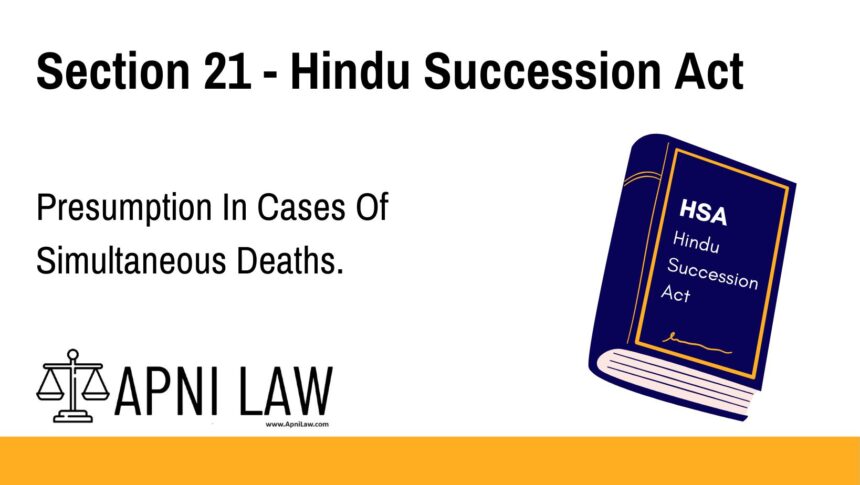Code: Section 21 – Presumption in Cases of Simultaneous Deaths
Where two persons have died in circumstances rendering it uncertain whether either of them, and if so which, survived the other, then, for all purposes affecting succession to property, it shall be presumed, until the contrary is proved, that the younger survived the elder.
Explanation of Section 21 of the Hindu Succession Act
Section 21 of the Hindu Succession Act, 1956 deals with an important legal presumption in cases where two individuals die simultaneously or under circumstances that make it impossible to determine who died first. This is particularly relevant in cases involving inheritance and succession rights.
The provision creates a rebuttable presumption that, in such cases, the younger person is deemed to have survived the elder. This legal presumption ensures that succession and property division are not stalled due to the ambiguity of death order. However, this presumption can be overturned with evidence proving who actually died first.
This section becomes crucial when both individuals have a mutual or overlapping interest in property, such as spouses, parents and children, or siblings.
Illustration
Example 1: Husband and Wife Die in an Accident
A husband (age 60) and his wife (age 55) die in a car accident, and there is no evidence as to who died first. For the purposes of succession, it is presumed that the younger person (the wife) survived the elder (the husband). Therefore, property owned solely by the husband will first be deemed to pass to the wife, and then from her to her heirs.
Example 2: Parent and Child Die in a Calamity
A father and his son die in a building collapse, and it is impossible to determine who died first. If the father is 70 and the son is 40, it will be presumed that the son survived the father. Consequently, succession rights will be determined on that basis unless proven otherwise.
Common Questions and Answers on Section 21 Hindu Succession Act
1. What does Section 21 of the Hindu Succession Act deal with?
It deals with cases of simultaneous or uncertain deaths and presumes that the younger person survived the elder for purposes of property succession.
2. Can this presumption be challenged in court?
Yes, the presumption is rebuttable. If concrete evidence is presented proving the order of death, that evidence will override the presumption.
3. Why is such a presumption necessary?
This legal presumption provides clarity in succession matters and helps prevent legal disputes and delays due to uncertainty in the order of death.
4. Does this rule apply only to Hindus?
Yes, the Hindu Succession Act applies to individuals governed by Hindu personal law, including Buddhists, Jains, and Sikhs.
5. Does the younger person automatically inherit all property?
No, they are presumed to survive the elder only for determining succession. The actual inheritance depends on the applicable succession rules and heirs under the Act.
Conclusion
Section 21 of the Hindu Succession Act, 1956 serves as a practical legal tool to resolve succession issues arising from simultaneous or uncertain deaths. By presuming that the younger outlived the elder, it provides a logical and orderly approach to inheritance. This section not only simplifies succession in complex cases but also reduces the potential for prolonged legal disputes.
For more in-depth legal explanations and expert guidance, visit ApniLaw today.








